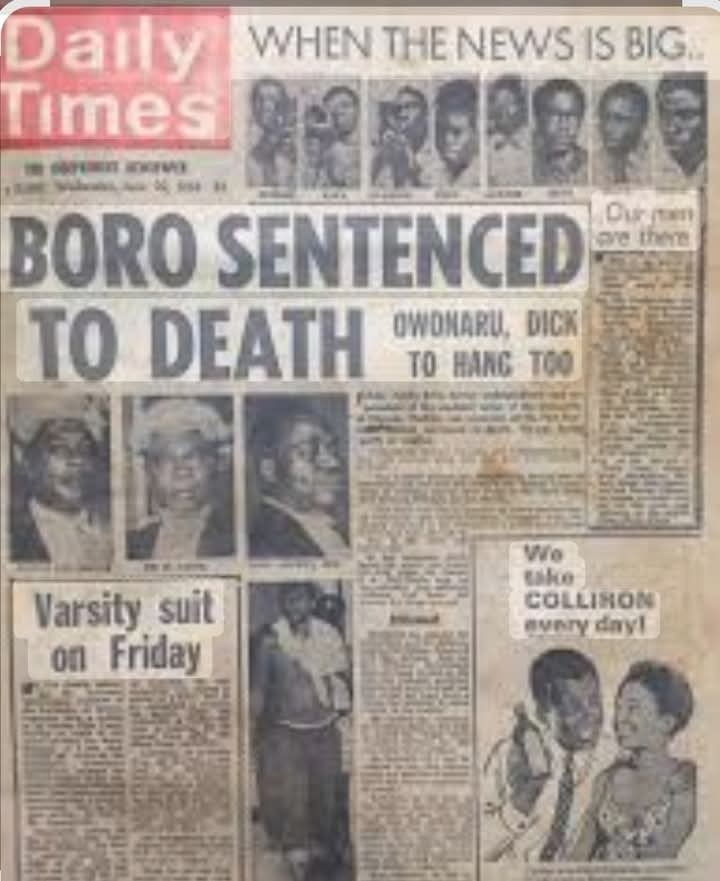Daily Times Front Page (June 22, 1966): “Boro Sentenced to Death” — The Story of a Revolutionary’s Trial and Legacy

How Isaac Adaka Boro’s conviction marked a pivotal moment in Nigeria’s early post-independence struggle for justice and minority rights
The Headline That Shook Nigeria
The Daily Times newspaper of Wednesday, 22 June 1966, carried a headline that captured national attention: “BORO SENTENCED TO DEATH.” Beneath it, two of his associates — Samuel Owonaru and Notor Dick — were also reported to have been sentenced to hang. This edition of the Daily Times, one of Nigeria’s most influential papers at the time, reflected the tense political atmosphere of post-independence Nigeria.
Isaac Jasper Adaka Boro, a young Ijaw nationalist and former student activist, had become a symbol of resistance against perceived neglect and exploitation of the Niger Delta region. His trial and sentencing represented both a personal tragedy and a defining chapter in Nigeria’s political evolution.
Who Was Isaac Boro?
Born on 10 September 1938 in Oloibiri, in present-day Bayelsa State — the same town later celebrated as the site of Nigeria’s first oil discovery — Isaac Adaka Boro grew up witnessing the socio-economic disparity between oil-producing communities and the rest of the country.
After studying chemistry at the University of Nigeria, Nsukka (UNN), Boro became politically active, forming the University of Nigeria Students’ Union Government and later serving as its president. His idealism evolved into militancy when peaceful advocacy failed to yield results for the Niger Delta people.
The Twelve-Day Revolution
In February 1966, just weeks after Nigeria’s first military coup, Boro declared the short-lived Niger Delta Republic. Alongside Owonaru and Dick, he led what became known as the Twelve-Day Revolution — a secessionist movement aimed at drawing attention to the exploitation of the Niger Delta’s oil resources by both colonial and Nigerian authorities.
Although the rebellion was quickly suppressed by federal forces, it marked one of the earliest organised protests against environmental and economic injustice in the region.
The Trial and Sentencing
Boro and his men were captured and tried in Port Harcourt under charges of treason. The Daily Times front page from June 22, 1966, documented the outcome: a death sentence for Boro, Owonaru, and Dick.
The coverage also briefly mentioned a “Varsity suit on Friday,” an indication that the paper, while focused on the landmark ruling, continued to balance national and educational news.
Despite the harsh verdict, Boro’s courage and conviction struck a chord with many Nigerians who saw him as a freedom fighter rather than a criminal.
From Prisoner to War Hero
Boro’s story did not end at the gallows. He was later granted amnesty by General Yakubu Gowon in 1967, following the outbreak of the Nigerian Civil War. He subsequently joined the federal army, leading a special unit known as the Niger Delta Volunteer Force (NDVF), which fought on the side of the federal government against Biafran forces.
His deep knowledge of the Niger Delta terrain made him instrumental in the federal capture of the oil-rich Port Harcourt region. Tragically, Boro died in mysterious circumstances on 9 May 1968, aged just 29, reportedly during active military duty.
Legacy and Memory
Isaac Boro remains a revered figure in the Niger Delta and among advocates of minority rights in Nigeria. His struggle inspired later movements, including the Ijaw Youth Council and the Kaiama Declaration of 1998, both of which drew directly from Boro’s vision for self-determination and resource control.
Every May 16, the Niger Delta observes “Boro Day,” celebrating his contribution to regional awareness and national consciousness.
References
Daily Times (Nigeria), 22 June 1966, Lagos.
Alagoa, E. J. (2005). A History of the Niger Delta: An Historical Interpretation of Ijo Oral Tradition. Ibadan University Press.
Tamuno, T. N. (1970). The Evolution of the Nigerian State: The Southern Phase, 1898–1914. Longman.
Agbo, A. (2016). “Isaac Boro: The Man Who Fought for the Niger Delta.” Tell Magazine.
Onwubiko, C. (2020). “Remembering Isaac Boro: The Unsung Hero of Nigeria’s Niger Delta.” The Guardian Nigeria.

